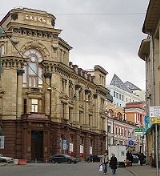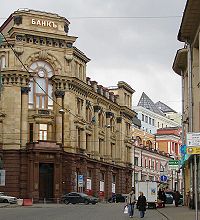
Lazar Polyakov
Encyclopedia
Lazar Polyakov was a Jewish–Russian entrepreneur. Polyakov founded his first bank in 1872 and by 1890s owned an influential financial group; he was informally named "Rothschild
of Moscow". His business collapsed in early 1900s and was completely disbanded by 1909.
and banker Yakov Polyakov, were born into the family of a small trader in Dubroŭna
. Lazar remained in the shadow of his better-known brother and employer Samuel until 1872, when he founded L. S. Polyakov Bank in Moscow.
In 1870s and 1880s Polyakov founded five more commercial banks (in Moscow, Oryol
, Saint Petersburg
and Odessa
) and two mortgage banks (Moscow, Yaroslavl
). He remained the principal shareholder and manager of these banks until their collapse in 1900s. The group also included insurance and trading companies. The assets of his top level holding companies were valued at 40 million roubles, mostly in the stock of his own enterprises.
Polyakov created wealth through stock exchange deals and trading in Ukrainian and Southern Russian wheat
. His business rarely ventured into the textiles, metalworking and real estate that were the fields of traditional Moscow bankers. However, the Jewish sources point at the rivalry between Polyakov and ethnic Russian bankers represented by the mayor of Moscow Nikolay Alekseyev
. This competition allegedly influenced the deportation of Jews of 1891–1892.
 Polyakov's continuing practice of relying on the inflated value of his own stock used as collateral contributed to his own demise. It started with Yakov Polyakov's bank problems in 1898. Then in 1901 Yakov's Peterburg-Azov Bank collapsed beyond recovery. Recession of 1900s brought the stock prices down. Polyakov defaulted on his loans and his banks folded one by one. The Ministry of Finance, fearing a domino effect
Polyakov's continuing practice of relying on the inflated value of his own stock used as collateral contributed to his own demise. It started with Yakov Polyakov's bank problems in 1898. Then in 1901 Yakov's Peterburg-Azov Bank collapsed beyond recovery. Recession of 1900s brought the stock prices down. Polyakov defaulted on his loans and his banks folded one by one. The Ministry of Finance, fearing a domino effect
bank run
, initially supported Polyakov's banks. However as the crisis developed the banker himself became an obstacle to restructuring.
In 1909 the Ministry of Finance took over the last three surviving banks and consolidated them into a new United Bank . The three banks declared 25 million roubles in assets of which 17.5 million were written off as bad debt. United Bank was chaired by an ethnic Russian appointed by the government, while Polyakov's son Alexander retained a seat on the board of directors.
In the end, Lazar's own finances were ruined to the extent that his own sons refused to take up his debt-ridden estate upon his death.
Lazar Polyakov remained the leader of Moscow Jewish community for 35 years, and has been the main sponsor of Moscow Choral Synagogue
. Prior to its completion in 1906, Polyakov allowed the congregation to pray in his own house. Rebbe
Mase said in the funeral eulogy
, that "his name is retold in fairytales across the pale of settlement
. Our poorer brethren, blessing themselves on their wedding days, say 'Let G-d make you equal to Polyakov'".
Rothschild family
The Rothschild family , known as The House of Rothschild, or more simply as the Rothschilds, is a Jewish-German family that established European banking and finance houses starting in the late 18th century...
of Moscow". His business collapsed in early 1900s and was completely disbanded by 1909.
Biography
Lazar and his brothers, future railroad magnate Samuel PolyakovSamuel Polyakov
Samuel Polyakov was a Russian businessman, informally known as the "most famous railroad king" of the Russian Empire, the senior member of the Polyakov business family, a philanthropist and a Jewish civil rights activist, co-founder of World ORT. Polyakov's business interests concentrated in...
and banker Yakov Polyakov, were born into the family of a small trader in Dubroŭna
Dubrouna
Dubroŭna or Dubrovno is a small town on the Dnieper River. The toponym originates from a Proto-Slavic term for an oak forest, which may explain the inclusion of oak leaves and acorns in the town's coat of arms...
. Lazar remained in the shadow of his better-known brother and employer Samuel until 1872, when he founded L. S. Polyakov Bank in Moscow.
In 1870s and 1880s Polyakov founded five more commercial banks (in Moscow, Oryol
Oryol
Oryol or Orel is a city and the administrative center of Oryol Oblast, Russia, located on the Oka River, approximately south-southwest of Moscow...
, Saint Petersburg
Saint Petersburg
Saint Petersburg is a city and a federal subject of Russia located on the Neva River at the head of the Gulf of Finland on the Baltic Sea...
and Odessa
Odessa
Odessa or Odesa is the administrative center of the Odessa Oblast located in southern Ukraine. The city is a major seaport located on the northwest shore of the Black Sea and the fourth largest city in Ukraine with a population of 1,029,000 .The predecessor of Odessa, a small Tatar settlement,...
) and two mortgage banks (Moscow, Yaroslavl
Yaroslavl
Yaroslavl is a city and the administrative center of Yaroslavl Oblast, Russia, located northeast of Moscow. The historical part of the city, a World Heritage Site, is located at the confluence of the Volga and the Kotorosl Rivers. It is one of the Golden Ring cities, a group of historic cities...
). He remained the principal shareholder and manager of these banks until their collapse in 1900s. The group also included insurance and trading companies. The assets of his top level holding companies were valued at 40 million roubles, mostly in the stock of his own enterprises.
Polyakov created wealth through stock exchange deals and trading in Ukrainian and Southern Russian wheat
Wheat
Wheat is a cereal grain, originally from the Levant region of the Near East, but now cultivated worldwide. In 2007 world production of wheat was 607 million tons, making it the third most-produced cereal after maize and rice...
. His business rarely ventured into the textiles, metalworking and real estate that were the fields of traditional Moscow bankers. However, the Jewish sources point at the rivalry between Polyakov and ethnic Russian bankers represented by the mayor of Moscow Nikolay Alekseyev
Nikolay Alekseyev
Nikolay Aleksandrovich Alekseyev , 1893) was the elected mayor of Moscow in 1885–1893. Alekseyev is credited with construction of the city's first sanitation system, the first pressurized water supply network reaching individual houses, a psychiatric hospital and 30 new public schools...
. This competition allegedly influenced the deportation of Jews of 1891–1892.

Domino effect
The domino effect is a chain reaction that occurs when a small change causes a similar change nearby, which then will cause another similar change, and so on in linear sequence. The term is best known as a mechanical effect, and is used as an analogy to a falling row of dominoes...
bank run
Bank run
A bank run occurs when a large number of bank customers withdraw their deposits because they believe the bank is, or might become, insolvent...
, initially supported Polyakov's banks. However as the crisis developed the banker himself became an obstacle to restructuring.
In 1909 the Ministry of Finance took over the last three surviving banks and consolidated them into a new United Bank . The three banks declared 25 million roubles in assets of which 17.5 million were written off as bad debt. United Bank was chaired by an ethnic Russian appointed by the government, while Polyakov's son Alexander retained a seat on the board of directors.
In the end, Lazar's own finances were ruined to the extent that his own sons refused to take up his debt-ridden estate upon his death.
Lazar Polyakov remained the leader of Moscow Jewish community for 35 years, and has been the main sponsor of Moscow Choral Synagogue
Moscow Choral Synagogue
The Moscow Choral Synagogue is the main synagogue in Russia and in the former Soviet Union. It is located in central Basmanny District at 10, Bolshoy Spasogolinischevsky Lane, close to Kitai-Gorod Metro station. Rabbi Pinchas Goldschmidt is the spiritual head of this Synagogue.-History:The...
. Prior to its completion in 1906, Polyakov allowed the congregation to pray in his own house. Rebbe
Rebbe
Rebbe , which means master, teacher, or mentor, is a Yiddish word derived from the Hebrew word Rabbi. It often refers to the leader of a Hasidic Jewish movement...
Mase said in the funeral eulogy
Eulogy
A eulogy is a speech or writing in praise of a person or thing, especially one recently deceased or retired. Eulogies may be given as part of funeral services. However, some denominations either discourage or do not permit eulogies at services to maintain respect for traditions...
, that "his name is retold in fairytales across the pale of settlement
Pale of Settlement
The Pale of Settlement was the term given to a region of Imperial Russia, in which permanent residency by Jews was allowed, and beyond which Jewish permanent residency was generally prohibited...
. Our poorer brethren, blessing themselves on their wedding days, say 'Let G-d make you equal to Polyakov'".

